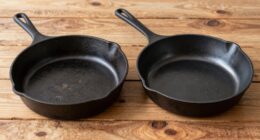Choosing the right butter spatula depends on your cooking needs and preferences. For durability, stainless steel offers high heat resistance and a sleek look, while silicone provides flexibility and is great for non-stick cookware. Wooden spatulas are gentle on surfaces and eco-friendly. Plastic, bamboo, nylon, or composite options each have unique benefits like lightweight handling or eco-consciousness. Continue exploring to find the perfect spatula that blends safety, performance, and sustainability for your kitchen.
Key Takeaways
- Consider silicone or wooden spatulas for gentle, non-stick butter handling to prevent scratching and preserve cookware.
- Choose stainless steel for high-heat tasks like searing or flipping buttered foods with durability and precision.
- Opt for eco-friendly materials like bamboo for sustainable, biodegradable butter spatulas that are lightweight and resistant to moisture.
- Ensure proper maintenance—hand wash wooden and silicone spatulas to extend lifespan and keep them food-safe.
- Match spatula material to your cookware type and cooking needs, balancing safety, performance, and environmental impact.
Stainless Steel Spatulas

Stainless steel spatulas are a popular choice for their durability and sleek appearance. While they don’t typically have a non-stick coating, their sturdy metal surface makes them ideal for flipping and turning foods without bending or breaking. Their heat resistance is impressive, allowing you to cook directly over high heat without warping or damage. This makes them perfect for searing meats or sautéing vegetables. Additionally, stainless steel spatulas can be integrated with AI technology to enhance precision in cooking techniques. However, because they lack a non-stick coating, you’ll need to be more careful to prevent food from sticking or scratching your cookware. Stainless steel spatulas are easy to clean and highly durable, making them a reliable addition to your kitchen arsenal. Just keep in mind they don’t offer the non-stick benefits of silicone or coated options.
Silicone Spatulas

Silicone spatulas are a versatile choice for a variety of cooking tasks, especially when gentle contact with non-stick cookware is needed. They excel in mixing, scraping, and folding without damaging delicate surfaces. To keep your silicone spatula in top shape, proper silicone spatula maintenance is essential; wash it with warm, soapy water after each use and avoid abrasive cleaners. Silicone heat resistance allows you to use these spatulas at high temperatures without melting or warping, making them perfect for stirring hot sauces or melting butter directly in the pan. Additionally, silicone spatulas won’t stain or absorb odors, ensuring long-lasting performance. Their flexibility and durability make them a practical, low-maintenance choice for everyday cooking tasks. Regular inspection of silicone utensils can help identify wear and prevent potential material degradation.
Wooden Spatulas

Wooden spatulas are made from natural materials, making them environmentally friendly and safe for your kitchen. They’re gentle on non-stick cookware, preventing scratches and damage. Plus, they’re easy to clean and maintain, ensuring your spatula stays in good shape over time. Incorporating creative projects into your cooking routine can also help foster a more engaging family environment.
Natural Material Benefits
Because of their natural qualities, wooden spatulas offer several benefits that make them a popular choice. Their artisanal craftsmanship guarantees each piece is uniquely crafted, adding a touch of tradition to your kitchen. Wooden spatulas are also naturally aesthetic, with warm tones and textures that enhance your cookware’s look. They don’t conduct heat, so you can handle hot ingredients comfortably without worry. Plus, wood is a renewable resource, making these spatulas an eco-friendly option. Their durability, combined with a timeless appeal, means you’ll enjoy using them for years. The natural material also resists staining and odors better than synthetic alternatives, keeping your utensils looking and smelling fresh. Additionally, wooden utensils are less likely to scratch your cookware’s surface, protecting your pots and pans. Overall, wooden spatulas blend function with beauty, making them a practical and attractive addition to your cooking tools.
Gentle on Cookware
Since they have a smooth, gentle surface, wooden spatulas won’t scratch or damage your cookware, even with frequent use. This makes them ideal for pots and pans with delicate non-stick coatings, helping you preserve their longevity. Their gentle touch guarantees you won’t accidentally chip or scrape the coating, maintaining your cookware’s performance. Additionally, wooden spatulas often feature an ergonomic design, providing a comfortable grip that reduces hand fatigue during extended cooking sessions. Unlike metal or abrasive tools, they won’t cause scratches or dents, keeping your cookware in top shape. Their natural material absorbs less heat, making them safer and more comfortable to handle. Moreover, color accuracy in kitchen tools can influence how well you see and judge your ingredients, ensuring precise cooking results. Overall, wooden spatulas are a thoughtful choice for gentle, effective cooking that protects your cookware investment.
Easy to Maintain
Maintaining wooden spatulas is straightforward, making them a convenient choice for busy kitchens. To keep them in top shape, use gentle cleaning techniques like hand washing with warm water and mild soap. Avoid soaking or putting them in the dishwasher, which can cause cracking. After cleaning, dry your spatula thoroughly and store it in a dry, ventilated space to prevent warping or mold. Consider a storage solution like hanging hooks or a utensil drawer organizer to keep them accessible and protected. Proper maintenance practices can extend the lifespan of your wooden spatulas. Here’s a quick overview:
| Cleaning Techniques | Storage Solutions |
|---|---|
| Hand wash only | Hang on hooks or rack |
| Avoid soaking | Keep in a dry, ventilated space |
| Dry thoroughly | Store away from moisture |
Plastic Spatulas

Plastic spatulas are known for their good flexibility, making it easy to scrape every bit of butter from your bowl. They’re also generally durable enough for daily use, but you should check if they resist heat and won’t crack over time. Most plastic spatulas are food-safe and won’t react with ingredients, ensuring your butter stays uncontaminated. Additionally, choosing a plastic spatula made from high-quality materials can enhance its longevity and performance.
Durability and Flexibility
While plastic spatulas are often praised for their lightweight design, their durability and flexibility vary widely depending on the quality of the material used. A high-quality plastic spatula offers an ergonomic grip, making it comfortable to hold during extended use. Look for spatulas with reinforced handles or thicker edges, as these tend to be more durable and resistant to cracking or warping. Heat resistance is essential—cheaper plastics may melt or deform when exposed to high temperatures, reducing flexibility and lifespan. A well-made plastic spatula maintains its shape and flexibility even after frequent use, allowing you to scrape and fold ingredients easily. Choosing a spatula with these qualities guarantees you’ll get a reliable tool that lasts and performs well in your kitchen.
Safety and Food Compatibility
Choosing a spatula that’s safe and compatible with your food guarantees you avoid unwanted chemical leaching or flavor transfer. When selecting a plastic spatula, consider allergy considerations—some plastics may cause reactions in sensitive individuals. Look for BPA-free options to minimize health risks. Heat resistance is also crucial; a spatula that withstands high temperatures prevents melting or warping during cooking, reducing contamination risks. Ensure the plastic is labeled oven-safe if you plan to use it with hot ingredients. Additionally, check for food-grade certifications to confirm it’s safe for kitchen use. By paying attention to allergy considerations and heat resistance, you ensure your spatula is both safe and suitable for your culinary needs, protecting your health and maintaining food integrity. Energy-efficient features in some plastic spatulas can also help reduce overall kitchen energy consumption.
Bamboo Spatulas

Bamboo spatulas offer a natural, eco-friendly alternative to synthetic utensils, making them an excellent choice for gentle mixing and scraping. These spatulas are lightweight and sturdy, providing control without adding strain to your hand. Bamboo is a natural material that resists heat and moisture, making it ideal for delicate cooking tasks like stirring sauces or spreading butter. As eco-friendly kitchen tools, they’re sustainable and biodegradable, reducing your environmental impact. Bamboo spatulas won’t scratch non-stick cookware, preserving your pots and pans. Plus, their smooth surface makes cleaning straightforward. Whether you’re mixing batter or scraping the last bit of butter from a bowl, bamboo spatulas combine practicality with eco-consciousness, making them a smart addition to your kitchen arsenal.
Nylon Spatulas

Nylon spatulas are versatile tools that excel in handling a variety of cooking tasks thanks to their heat-resistant properties. They are perfect for delicate cooking techniques like stirring sauces or scraping bowls without damaging non-stick surfaces. Plus, their sleek designs enhance kitchen aesthetics, adding a modern touch. Nylon spatulas are durable, flexible, and easy to clean, making them a practical choice for everyday use. They withstand temperatures up to 400°F, so you can comfortably use them on hot dishes. To help you choose, consider the following features: heat resistance, which prevents melting or warping during high-temperature cooking.
Resin and Composites

Have you ever considered how resin and composite spatulas can enhance your culinary tools? These materials offer durability and versatility, making them ideal for various kitchen tasks. Resin and composites are lightweight yet strong, so your spatula design can feature thinner edges for precise scraping and spreading. Their non-reactive nature guarantees they won’t stain or absorb odors, keeping your tools fresh. Plus, they resist heat and chemicals, making them suitable for handling hot ingredients and cleaning easily. When choosing a spatula made from resin and composites, look for ergonomic handles and a balanced weight. This combination of material and design improves your comfort and control, helping you work more efficiently. Resin and composite spatulas are a smart choice for anyone seeking reliable, long-lasting kitchen tools. Additionally, understanding material properties can help you select the most suitable spatula for your needs.
Copper and Metal Blends

Copper and metal blend spatulas combine the excellent heat conductivity of copper with the strength and durability of other metals, making them a versatile choice for your kitchen. They excel at maintaining consistent cooking temperature, allowing you to control heat better while preparing butter or other ingredients. The superior heat conductivity guarantees quick response to temperature changes, reducing the risk of burning delicate foods. These spatulas are ideal for high-precision tasks, such as stirring or scraping during stovetop cooking. Their sturdy construction withstands frequent use without warping or bending. While the copper core provides excellent heat transfer, the added metals reinforce the spatula’s durability. Overall, copper and metal blends offer a reliable, high-performance option that balances heat responsiveness with long-lasting strength.
Eco-Friendly and Sustainable Materials

Eco-friendly and sustainable materials are gaining popularity as many cooks seek environmentally responsible choices for their kitchens. You’ll find recyclable options like bamboo or certain plastics that can be repurposed or recycled after use. Biodegradable alternatives, such as utensils made from plant-based materials, break down naturally and reduce waste. These options help lower your environmental footprint without sacrificing performance. When choosing a butter spatula, look for products labeled as biodegradable or made from sustainably sourced materials. Not only do these choices support eco-conscious practices, but they also ensure your kitchen remains environmentally friendly. By selecting spatulas crafted from recyclable and biodegradable materials, you contribute to reducing plastic waste and promoting sustainability in your cooking routine.
Frequently Asked Questions
How Do I Prevent Silicone Spatulas From Melting at High Temperatures?
To prevent silicone spatulas from melting at high temperatures, you should pay attention to their heat resistance and material durability. Always check the manufacturer’s temperature guidelines before using it with hot items. Opt for spatulas made from high-quality silicone designed for high heat, typically rated above 450°F. Avoid exposing your spatula to direct flame or prolonged heat, and replace it if it shows signs of wear or damage to guarantee safety and longevity.
Are Wooden Spatulas Safe for Non-Stick Cookware?
You might wonder if wooden spatulas are safe for non-stick cookware. The answer hinges on wooden durability and non-stick concerns; luckily, wooden spatulas are gentle and won’t scratch surfaces. They’re safe for non-stick pans, reducing the risk of damage, but avoid soaking them long-term to prevent warping. With proper care, wooden spatulas can be both durable and a safe choice, preserving your cookware’s integrity while offering timeless style.
Can Bamboo Spatulas Be Dishwasher Safe?
Bamboo spatulas can be dishwasher safe, but it depends on their durability and finish. Bamboo’s durability varies, so high-quality bamboo spatulas with a sealed finish tend to withstand dishwasher use better. Always check the manufacturer’s instructions to guarantee dishwasher safety, as some may recommend hand washing to preserve the material. Proper care extends the lifespan of your bamboo spatula, keeping it functional and beautiful longer.
What Is the Best Way to Clean Resin and Composite Spatulas?
Imagine uncovering the secret to perfect resin spatula cleaning—it’s simpler than you think. For resin spatula maintenance, soak it in warm, soapy water and gently scrub with a soft brush. For composite spatulas, avoid harsh chemicals; instead, use isopropyl alcohol or specialized cleaners. Rinse thoroughly, dry well, and store properly. Mastering resin and composite spatula cleaning keeps your tools in top shape, ensuring flawless results every time.
Do Copper Spatulas React With Food or Utensils?
Copper spatulas can react with certain foods, leading to copper corrosion which might cause health concerns. You might also notice utensil discoloration over time, especially if exposed to acidic ingredients. To avoid these issues, it’s best to use copper spatulas carefully and clean them regularly. If you’re worried about reactions, consider using utensils made of stainless steel or silicone, which are less reactive and won’t discolor or corrode easily.
Conclusion
So, now you’re armed with the ultimate butter spatula guide—your culinary sidekick in shiny steel, flexible silicone, or eco-friendly bamboo. Whether you fancy flipping pancakes like a pro or scraping every last bit of goodness from the bowl, there’s a perfect spatula waiting. Just remember, choosing the right material isn’t just about function—it’s about making your kitchen look like a posh art gallery… or at least preventing your spatula from melting into a gooey mess. Happy cooking!









